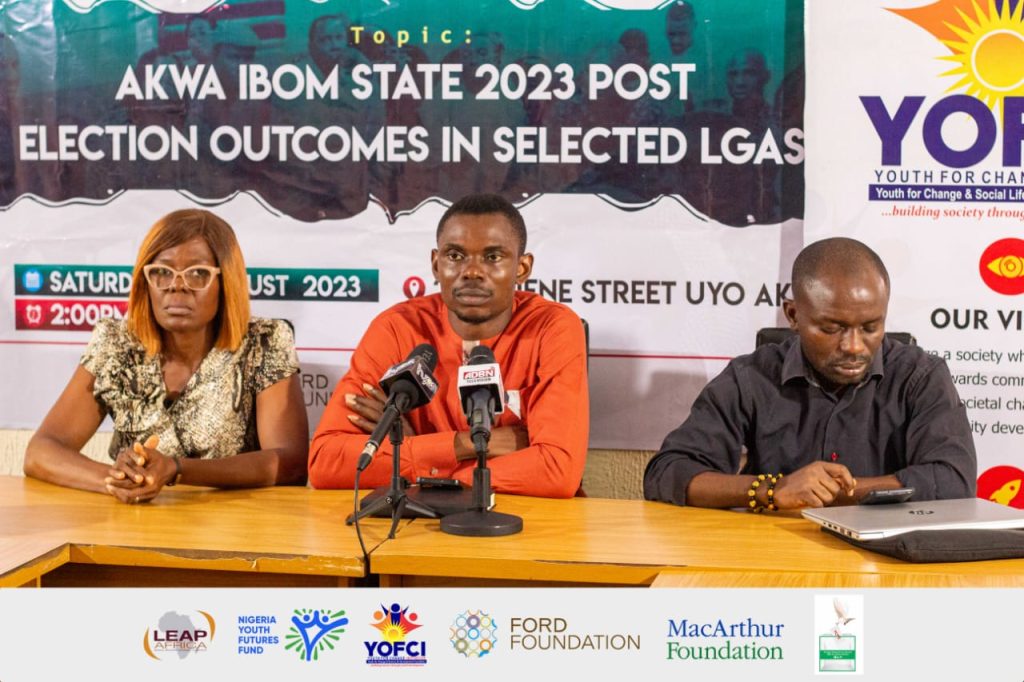Why Red Zones In Akwa Ibom Recorded Low Violence During General Election- YOFCI Opens up

A Civil Society Organisation, Youth for Change and Social Life Development Foundation (YOFCI) has offered explanation as to why the last general election experienced reduced violence contrary to earlier reports which spotlighted and predicted some communities as red zones that may witness increased electoral violence.
Reports prominent among them which was published by Foundation for Partnership Initiatives in the Niger Delta (PIND) had identified communities that were highly prone to violence and conflicts across the three senatorial districts of Akwa Ibom State to include Itu and Ibiono Ibom in Uyo Senatorial District, Onna and Eket in Eket Senatorial District, and Essien Udim and Ini in Ikot Ekpene Senatorial District.
YOFCI in a media briefing held during the weekend said the presence of several key political aspirants from the identified local government areas, the feelings or sense of disenfranchisement by unacceptable party permutations in the internal nomination of party candidates were some of the underlying factors that fueled the high rate of conflict and violence propensity in the targeted locations of the project.
The Project Lead, Harrison Udim said that after perusing the reports, the organisation had sought to ensure the projection does not come to reality hence moved to implement the Strategic Engagement and Advocacy for 2023 Peaceful Election (SEA-P), Project in Akwa Ibom State.
Udim noted that through strategic engagement and advocacy, YOFCI was able to raise citizen’s awareness, voice, and action on conflict sensitivity and violence before, during, and after the 2023 general elections.
He said this was done through advocacy visits to relevant stakeholders’, town-hall meetings, sensitization, capacity building, and the effective use of media, on how to maintain peace and reduce conflict and violence all through the 2023 general election process.
Some of the project the organisation identified to having been executed included press release issued at the flag off of the project, inception meeting with other Civil Society Organisations (CSOs) and media partners, production of Information Education and Communication (IEC) materials for awareness creation, stakeholders’ engagement in project target locations, and governorship candidate peace pact signing at the Akwa Ibom State Governorship debate.
Others included post-election outcomes media briefing; and post-election media engagements on several media house platforms.
Udim explained that the SEA-P project promoted the collection of PVCs across the state, encouraged active citizen participation in voting on designated election days, tracked and reported incidents of violence in spotlight communities for immediate interventions, and mitigated incidence of violence through strategic stakeholder engagement and communication across the state but specifically in Itu, Ibiono Ibom, Onna, Eket, Essien Udim and Ini local government areas.
The Project Lead noted that the project had so far equipped citizens with information on how to conduct themselves in a peaceful manner all through the election period to avoid conflict or violence.
Udim said the effort had birthed good results evidenced in the fact that besides the exception of the few election violent incidents that was recorded in Ibiono Ibom local government area during the SEA-P project cycle, official election analysis reports published on the target local government areas show that the contributions of SEA-P helped in fostering active citizen’s participation in the electoral process, peaceful electoral processes, and less violent outcomes especially when compared to the initial reports that identified these locations as possible hotspots for high election violence and conflicts.
The SEA-P project which will climax in November 2023 is funded by LEAP Africa, implemented under the Nigeria Youth Future Fund (NYFF), and jointly supported by Ford Foundation and MacArthur Foundation.









